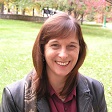Spotlight, August 2015
When Katherine Strand developed MUS E232 Inclusive Participatory Music Practices, a course for future music teachers, she made sure it would broaden students’ horizons by immersing them in music they may never have experienced before through active learning.
The course introduced students to multicultural music and had a service-learning component, helping students to identify “what they might teach and how they might teach it,” Strand said. Students learned how to foster inclusive, participatory practices for the purpose of community music-making.
“We defined this together as music that emanates from a sense of community… the antithesis of director-led ensembles,” Strand explained.
The students, most of whom are classically trained, explored various types of collaborative activities, such as song writing, garage bands, singing circles, and drum circles. They also had to learn guitar, which put them back in the situation of being novices.
“All along the way, at every step, we learn something and talk about, ‘what does it mean to teach this?’” Strand said.
Most of the students in the class are music education freshmen, and Strand said they often don’t identify as educators instead of learners until much later in college. Students are used to paying attention to content, Strand explained, but find it hard to pay attention to how an instructor models teaching.
“We want the transition [to a teaching identity] earlier so that they have a library of strategies and the fluidity that teaching requires,” Strand said.
The process in Strand’s course is to recognize the teaching model and then critique and think deeply about it. Students considered, for example, how they would need to teach material differently for various scenarios, such as a larger class size.
“They were coming up with lesson plans and testing them,” Strand said. “It was hugely active.”
For the service-learning component of the course, students taught four projects by means of “informances,” which are informational, sometimes interactive performances.
Twice at St. Charles Catholic School, they taught circle singing and improvisation. At the Ellettsville Boys and Girls Club, they taught the children how to create a cappella groups and how to recreate a pop song—Royals by Lorde—on classroom instruments.
Students also prepared lesson plans for University Elementary, which they field-tested and revised in class the day before they went to the elementary school.
Strand had students use Canvas’ video recording function to create pre- and post-service-learning reflections. Next time she teaches the course, she plans to have students view and comment on each other’s reflections, as “reflections are not valid without feedback.”
Strand found that her students were invested in the coursework, and she used various activities to assess whether they were emotionally, behaviorally, and intellectually engaged.
“In general, behaviorally, they were there with us,” Strand said. “The discussion boards were to see if they were intellectually engaged.”
For the discussion boards, Strand was impressed with the depth of thinking and contribution of ideas from her students, who had to write one post each per topic and then respond to two other students. The discussion boards were also used for sharing poems they wrote, which were later adapted into songs.
“They wrote volumes. They really took to communal learning,” Strand said.
Strand used the discussion boards for formative assessment and also had the students write synthesis papers, which she used for summative assessment.
The course was “spectacularly active,” Strand noted. She stressed that “passive learning isn’t learning,” and for music students, sometimes it is even easy to be active without learning, as they can simply follow the director and play notes on the page.
What she wants is for her students to “learn deeply, and keep attention on the model of teaching.”
By breaking the stereotype of the traditional ensemble and having her students engage in forms of music that were new to them, Strand accomplished this goal.
 Katy Strand is an Associate Professor of Music in the Jacobs School of Music.
Katy Strand is an Associate Professor of Music in the Jacobs School of Music.

